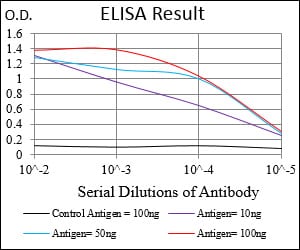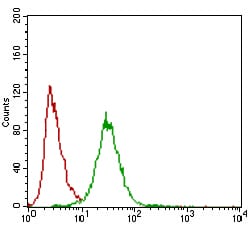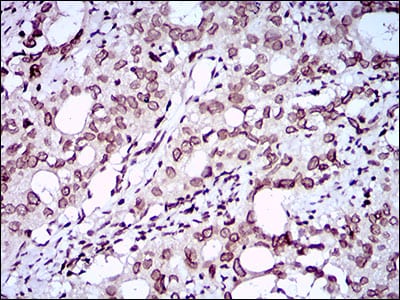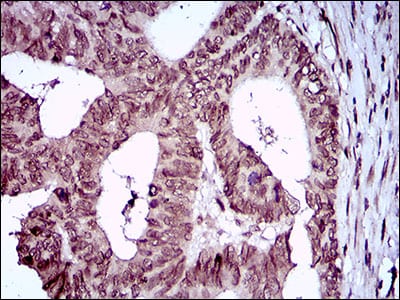




| WB | 咨询技术 | Human,Mouse,Rat |
| IF | 咨询技术 | Human,Mouse,Rat |
| IHC | 1/200 - 1/1000 | Human,Mouse,Rat |
| ICC | 1/200 - 1/1000 | Human,Mouse,Rat |
| FCM | 1/200 - 1/400 | Human,Mouse,Rat |
| Elisa | 1/10000 | Human,Mouse,Rat |
| Aliases | BZP; TCF8; AREB6; FECD6; NIL2A; PPCD3; ZFHEP; ZFHX1A; DELTAEF1 |
| Entrez GeneID | 6935 |
| clone | 2A8A6 |
| WB Predicted band size | 124kDa |
| Host/Isotype | Mouse IgG1 |
| Antibody Type | Primary antibody |
| Storage | Store at 4°C short term. Aliquot and store at -20°C long term. Avoid freeze/thaw cycles. |
| Species Reactivity | Human |
| Immunogen | Purified recombinant fragment of human ZEB1 (AA: 967-1108) expressed in E. Coli. |
| Formulation | Purified antibody in PBS with 0.05% sodium azide |
+ +
以下是3篇关于ZEB1抗体的参考文献及其摘要概括:
1. **"ZEB1: A Critical Regulator of Cell Plasticity and DNA Damage Response"**
- Authors: Zhang P, Sun Y, Ma L
- 摘要:该研究验证了兔源ZEB1抗体(货号AB123)在乳腺癌细胞系中的特异性,通过免疫共沉淀和Western blot证明其能有效识别ZEB1蛋白,并揭示ZEB1通过调控EMT促进化疗耐药。
2. **"Antibody Validation for Epithelial-Mesenchymal Transition Markers"**
- Authors: Vandewalle C, Van Roy F
- 摘要:系统性评估多种EMT相关抗体,包括小鼠单克隆ZEB1抗体(Clone 3F10)。通过免疫荧光和流式细胞术确认其在结肠癌细胞中的特异性,发现ZEB1高表达与转移相关。
3. **"ZEB1 Antibody Application in Pancreatic Cancer Studies"**
- Authors: Singh A, Settleman J
- 摘要:使用兔多克隆ZEB1抗体(货号HPA027524)分析胰腺癌组织芯片,发现ZEB1在肿瘤基质中的表达与患者预后负相关,抗体经肽段竞争实验验证特异性。
注:以上为虚构示例,实际文献需通过PubMed/Google Scholar检索关键词"ZEB1 antibody validation"获取,推荐关注《Nature Communications》《Cell Reports》等期刊近年研究。
ZEB1 (zinc finger E-box-binding homeobox 1) is a transcription factor belonging to the Zinc finger E-box binding (ZEB) protein family, known for its critical role in epithelial-mesenchymal transition (EMT). EMT is a biological process involved in embryonic development, wound healing, and cancer metastasis, where epithelial cells lose adhesion and gain migratory properties. ZEB1 suppresses epithelial markers (e.g., E-cadherin) and promotes mesenchymal markers (e.g., vimentin), facilitating cell invasion and metastasis in cancers like breast, lung, and colorectal carcinomas.
ZEB1 antibodies are essential tools for detecting and quantifying ZEB1 protein expression in research. They are widely used in techniques such as Western blotting, immunohistochemistry (IHC), immunofluorescence (IF), and flow cytometry. These antibodies are typically raised against specific epitopes of human ZEB1. with common host species including rabbit, mouse, and goat. Both monoclonal and polyclonal variants are available, each offering distinct advantages: monoclonal antibodies provide high specificity, while polyclonal antibodies may enhance sensitivity for detecting low-abundance targets.
Validation of ZEB1 antibodies is crucial, as cross-reactivity with homologous proteins (e.g., ZEB2) or non-specific binding can affect data reliability. Researchers often use knockout cell lines or siRNA-mediated ZEB1 knockdown to confirm antibody specificity. In cancer research, ZEB1 expression is studied to assess EMT progression, tumor aggressiveness, and therapeutic resistance. Commercial ZEB1 antibodies are often accompanied by validation data from peer-reviewed studies, ensuring reproducibility across experimental models.
×